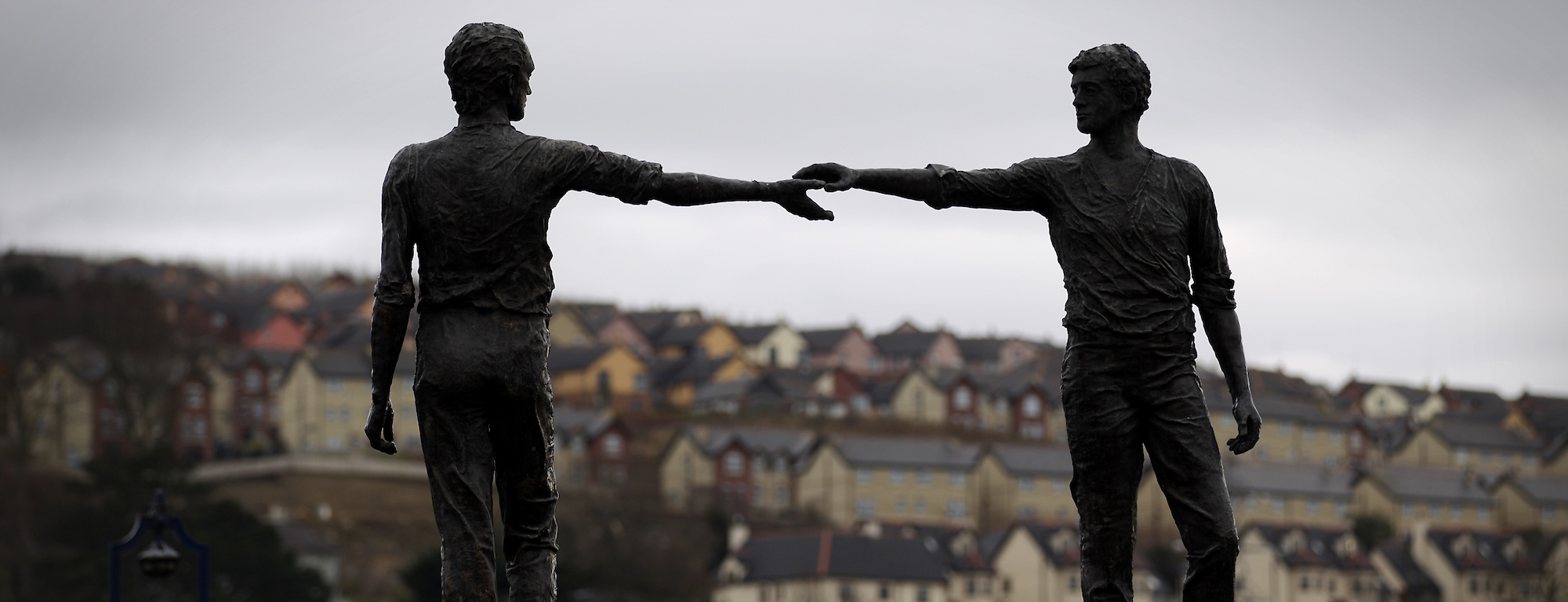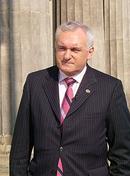
Taoiseach Dr. Bertie Ahern was first elected to the Dáil (Parliament) in 1977. He was Minister for Labour from March 1987 to November 1991 and was appointed Minister for Finance on three separate occasions from November 1991 to December 1994. He has served as Tánaiste (Deputy Prime Minister), Minister for Arts, Culture & the Gaeltacht and Minister for Industry and Commerce at various stages. His first ministerial appointment was as Government Chief Whip and Minister of State at the Department of the Taoiseach and at the Department for Defense in 1982. Taoiseach Ahern was a member of Dublin City Council from 1978 to 1988 and had the honor of serving as Lord Mayor of Dublin from 1986 to 1987. In November 1994 he was elected leader of his party Fianna Fáil and served as Leader of the Opposition from then until June 1997. He was first elected Taoiseach (Prime Minister) in June 1997, he was re-elected in June 2002 and again in May 2007. In 1997 Taoiseach Ahern received widespread praise for his political skills in ensuring that this administration served it full five year term and delivered on real political and economic progress for the Irish people. The defining moment of this period and a defining moment in Irish history was the successful negotiation with Tony Blair of the Good Friday Agreement between the British and Irish Governments and the political parties in Northern Ireland in April 1998. He was re-elected Taoiseach in June 2002. On 14 June, 2007, following a general election which saw his party, Fianna Fáil, returned to power Taoiseach Ahern was elected as Taoiseach for the third time. Over his entire career he has been central to reconciliation and negotiation on several fronts. Since leaving Government in 2008 Taoiseach Ahern has dedicated his time to Conflict Resolution and is actively involved with many groups around the world.
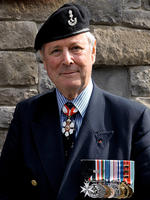
General John de Chastelain graduated from military college in 1960 with a commission in the Canadian Army and rose quickly through the ranks. In 1989, he was promoted to General and appointed Chief of the Defence Staff (CDS). During his tenure, the Canadian military was involved in the Oka crisis, as well as the first Gulf War and Somalia. He served as Canada’s Ambassador to the United States in 1993 before being reappointed to the post of CDS from which he retired in 1995. Since then, General de Chastelain has served as Chair of the Independent International Commission on Decommissioning in Northern Ireland. He helped forge the Belfast Agreement, the blueprint for peace in Northern Ireland signed on Good Friday, 1998. General de Chastelain was named to the Order of Canada in 1993, and a Companion of Honour in 1999.

Richard English is Professor of Politics at Queen’s University Belfast, where he is also Distinguished Professorial Fellow in the Senator George J. Mitchell Institute for Global Peace, Security and Justice, and the University’s Pro-Vice-Chancellor for Internationalization and Engagement. Between 2011 and 2016 he was Wardlaw Professor of Politics in the School of International Relations, and Director of the Handa Centre for the Study of Terrorism and Political Violence (CSTPV), at the University of St Andrews. He is the author of eight books, including the award-winning studies Armed Struggle: The History of the IRA (2003) and Irish Freedom: The History of Nationalism in Ireland (2006). His most recent book, Does Terrorism Work? A History, was published in 2016 by Oxford University Press. He is also the co-editor/editor of a further six books and has published more than fifty journal articles and book chapters. He is a frequent media commentator on terrorism and political violence, and on Irish politics and history, including work for the BBC, CNN, ITN, SKY NEWS, NPR, RTE, the Irish Times, the Times Literary Supplement, Newsweek, the Guardian, and the Financial Times. He is a Fellow of the British Academy (FBA), a Member of the Royal Irish Academy (MRIA), a Fellow of the Royal Society of Edinburgh (FRSE), a Fellow of the Royal Historical Society (FRHistS), an Honorary Fellow of Keble College Oxford, and an Honorary Professor at the University of St Andrews. In 2018 he was awarded a CBE for services to the understanding of modern-day terrorism and political history. He has delivered invited Lectures about his research in more than twenty countries.

Kieran McEvoy is Professor of Law and Transitional Justice at the School of Law and a Senior Research Fellow at the Institute of Conflict Transformation and Social Justice, Queen’s University Belfast. He has conducted research in over a dozen conflicted or transitional countries contexts on topics including politically motivated prisoners, ex-combatants, victims, amnesties, truth recovery, human rights, restorative justice and the role of lawyers in conflict transition. He has written or edited six books, a four volume Handbook of Transitional Justice, five special issues and over sixty journal articles and scholarly book chapters. His research has garnered several awards including the British Society of Criminology book of the year award and the Socio-legal Studies Association article of the year, 3 times. He is a Fellow of the Academy of Social Sciences. He has also been a Visiting Scholar at New York University Law School; University of Cambridge; the London School of Economics, the School of Law at Berkeley, and was a Fulbright Distinguished Scholar at Harvard Law School for a year. He is a long term human rights and peace activist in Northern Ireland, a former chair of the region’s main human rights NGO the Committee on the Administration of Justice (CAJ), and a founding member of Community Restorative Justice Ireland (CRJI). He also a member of the Board of the London based human rights NGO, Rights Watch UK.

Mitchel McLaughlin is the former General Secretary of Sinn Féin who also served as an MLA and was once the Speaker of the Northern Ireland Assembly. McLaughlin was born in the Bogside area of Derry, Northern Ireland and educated at Long Tower Boys School, Derry and Christian Brothers Technical College, Derry. He was elected a member of the Northern Ireland Assembly for Foyle in the 1998 assembly election and re-elected in 2003. In March 2007, McLaughlin transferred to the South Antrim constituency where he topped the poll during the 2007 Assembly election. He was re-elected at the 2011 Assembly election. In April 2018 he was appointed honorary professor in the George Mitchell Institute of Global Peace, Queens University Belfast.
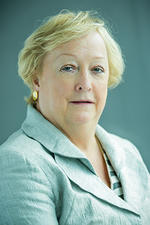
Monica McWilliams co-founded the Northern Ireland Women’s Coalition and was its representative at the multi-party peace talks leading to the Good Friday Agreement in 1998. She was subsequently elected to the Northern Ireland Assembly and was Chief Commissioner of the Northern Ireland Human Rights Commission from 2006-2011. She was appointed by the Minister of Justice to oversee prison reform in Northern Ireland and is currently a member of the Independent Reporting Commission on the disbandment of paramilitary organizations. She is Emeritus Professor at the Transitional Justice Institute at Ulster University and has published widely on women, peace and security. She holds several honorary doctorates for her work on domestic violence.
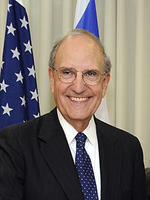
Senator George J. Mitchell became familiar with the workings of the U.S. Senate in the 1960s, when he served as Executive Assistant to Democratic Senator Edmund Muskie of Maine. In 1980, when Muskie resigned to become Secretary of State, Mitchell, who was then serving as a U.S. District Court Judge, was appointed to fill the vacancy. As a senator, he became a leading figure for the Democratic Party, and was credited with helping his party win back the majority in the Senate in 1986. Senator Mitchell was elected majority leader in 1989, a position he held until his retirement from the Senate in 1995. He was known among his colleagues in the Senate as an honest leader and skillful legislative strategist. After leaving the Senate, Mitchell was instrumental in negotiating a peace agreement in Northern Ireland and was awarded the Presidential Medal of Freedom. Senator Mitchell also served as U.S. Special Envoy for Middle East Peace.
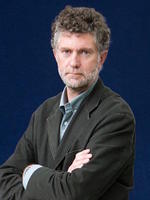
Jonathan Powell is the Founder and CEO of Inter Mediate, an NGO dedicated to conflict resolution around the world and former Chief of Staff to Tony Blair from 1995 to 2007. Powell was also appointed as the British Prime Minister’s Special Envoy to the Libyan transition in April 2014. Jonathan Powell was Tony Blair’s Chief of Staff in opposition from 1995 to 1997 and then his Chief of Staff in Downing Street from 1997 to 2007. Powell was also the British Government’s chief negotiator on Northern Ireland from 1997 to 2007 and played a key part in leading the peace negotiations to a successful conclusion over that decade, from the triumph of the Good Friday Agreement in 1998 though the nine-year battle to get its implementation agreed and a lasting settlement in place. Before working for Blair, Powell was a British diplomat from 1979 to 1994, specializing in negotiations. He was a member of the British team conducting the negotiations on the return of Hong Kong to the Chinese in the early 1980s under Percy Craddock, the Conference on Disarmament in Europe (CDE) arms control talks and the Conference on Security and Cooperation in Europe (CSCE) human rights talks with the Soviet Union in the mid-1980s, the Two plus Four talks on German Unification and the G7 in the late 1980s. As the political officer at the British Embassy in Washington he attached himself to the Presidential campaign of Arkansas Governor Bill Clinton in 1991 and stayed with it until Clinton’s victory in 1992. He subsequently introduced Tony Blair and Gordon Brown to Bill Clinton and his team in 1993 and played a key role in the building of the close relationship between the US President and the new British Prime Minister.

Peter Robinson is a British politician who served as First Minister of Northern Ireland from 2008 until 2016 and Leader of the Democratic Unionist Party (DUP) from 2008 until 2015. He has been involved in Northern Irish politics for over 40 years, being a founding member of the DUP along with the late Ian Paisley. Robinson served in the role of General Secretary of the DUP from 1975, a position which he held until 1979 and which afforded him the opportunity to exert unprecedented influence within the fledgling party. In 1977, Robinson was elected as a councilor for the Castlereagh Borough Council in Dundonald, and in 1979, he became the youngest-serving Member of Parliament (MP) when he was narrowly elected for Belfast East. He held this seat until his defeat by Naomi Long in 2010, making him the longest-serving Belfast MP since the 1800 Act of Union.

Peter Sheridan joined Co-operation Ireland in 2008 as Chief Executive. In addition to his role as CEO, Peter is an Equality Commissioner in NI and he is also a Commissioner with Londonderry Port and Harbour. Peter is a former Assistant Chief Constable with the PSNI (formerly the Royal Ulster Constabulary). He retired from the police service in 2008 having spent 32 years policing in NI. Before retiring he was responsible for the Crime Operations Department, which included serious and organised crime investigation including terrorist investigations. A graduate of Cambridge University, Peter attended the FBI Academy in 1999 and was awarded the OBE in the Queens Birthday Honours list in 2008 for services to the community.
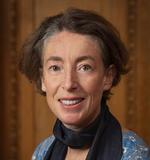
Emma Sky is Director of Yale’s Maurice R. Greenberg World Fellows Program and a Senior Fellow at the Jackson Institute, where she teaches Middle East politics. She is the author of The Unraveling: High Hopes and Missed Opportunities in Iraq. Sky served as advisor to the Commanding General of US Forces in Iraq from 2007-2010; as advisor to the Commander of NATO’s International Security Assistance Force in Afghanistan in 2006; as advisor to the US Security Co-ordinator for the Middle East Peace Process in 2005; and as Governorate Co-ordinator of Kirkuk for the Coalition Provisional Authority, 2003-2004. Prior to that, Sky worked in the Palestinian territories for a decade, managing projects to develop Palestinian institutions; and to promote co-existence between Israelis and Palestinians. In addition, Emma has provided technical assistance on poverty elimination, human rights, justice public administration reform, security sector reform, and conflict resolution in the Middle East, South Asia and Africa. Sky has published numerous articles including in The New York Times, Foreign Affairs, Foreign Policy, Politico, Atlantic, Slate, Survival, Center for a New American Security, US Institute of Peace, the Guardian, and the Journal of the Royal United Services Institute for Defense and Security Studies. Sky was educated at Oxford (UK), Alexandria (Egypt), Hebrew University of Jerusalem (Israel) and Liverpool (UK). Sky is an Officer of the British Empire.
